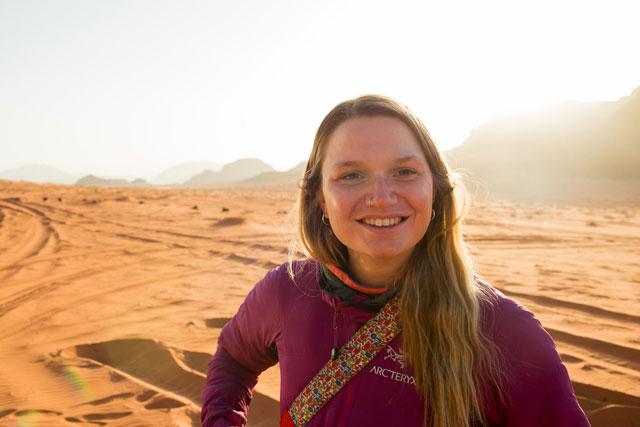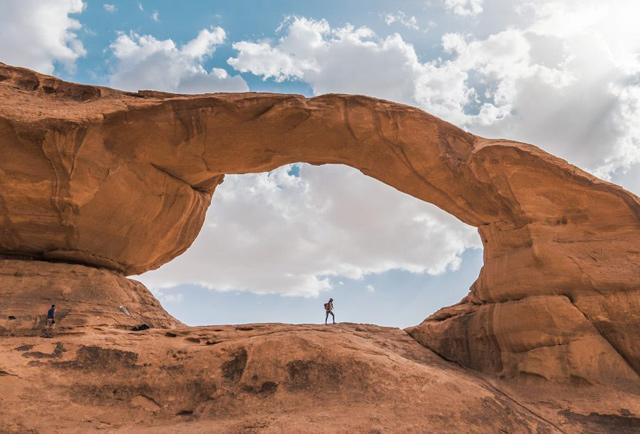You are here
Scholar examines impacts of environmental change on communities
By Saeb Rawashdeh - Apr 05,2023 - Last updated at Apr 06,2023

A view of the area near Karak where local communities engage with hikers and tourists (Photo courtesy of The Jordan Trail)
AMMAN — Connecting the dots between Bedouins in Jordan with post-colonial shifts and changes in the environment, visiting researcher at the Middle East University in Jordan, Olivia Mason, is embarking on a new project that explores the impacts of environmental change on Jordan’s communities.
“I will do this by focusing on nature reserves and protected areas in Jordan, and exploring how Bedouin and other desert communities in these areas understand and experience environmental change,” noted Mason, who originally hails from Newcastle University.
Nature reserves in Jordan are sites in which resource extraction and scarcity are connected in unique ways, Mason added.
According to the scholar, a central aspect of her research is understanding the ways that environmental changes and policies have altered community livelihoods and identities in or around nature reserves and protected areas in Jordan.
“Bedouin and pastoral communities,” Mason explained, “are often most impacted by climate change, as it decreases soil quality, vegetation cover and water availability. At the same time, they are often excluded from environmental decision making. What is more, conservation policies aimed at protecting nature often blame local communities, without acknowledging the important environmental knowledge they hold”.
Although the number of nature reserves in the Middle East has increased in the last couple of decades, “very few studies have explored the unique ways resource tensions are connected to [post-] colonialism and identity in these sites,” Mason said.
Existing studies of nature reserves are predominantly centred in North America and Europe, in which relationships between states, rural populations and the cultural histories of resources differ significantly compared with the post-colonial context of Jordan, she added.
This has resulted in environmental policies being implemented in Jordan that do not necessarily translate across differing contexts, nor consider the important ways post-colonialism has altered the environment, she said.
“The rapid urbanisation that has occurred in Jordan since 1948 has dramatically altered Jordan’s population distribution and the availability of good quality farm and grazing land, and in turn, livelihoods,” Mason said.
“The political geographies of Jordan present a crucial setting for this research,” Mason said, noting that her research is about understanding how [post-] colonial border drawing and changing rural politics are connected to resource scarcity.
Mason’s research draws on archival sources to understand the historical formation of environmental policies and nature conservation laws.
The project’s historical aspects are also significant, as colonial legacies of resource management and control — especially British models of nature reserves — have shaped identity formation and resource management into the present, Mason said.
By focusing on nature reserves in Jordan, Mason’s research offers an original case study to explore resource politics and management, nature reserves and indigeneity in an understudied post-colonial setting.
“This project will focus on three nature reserves or protected areas in Jordan: Wadi Rum; the Dana Biosphere Reserve; and Al Azraq Wetland Reserves,” Mason detailed.
Working alongside Mason is filmmaker Ali Barqawi and research assistant Sarah Rababah, also based at the Middle East University, who will assist in the production of a participatory film to communicate local communities’ experiences to a wider Jordanian audience.
“The film will be produced by the local communities themselves as part of the participatory approach of this project,” Mason said, noting that she hopes that this research will promote wider understanding and conversation about the impacts of environmental change on communities and in turn how nature conservation might work better with these communities.
Related Articles
AMMAN — After being denied reentry to Palestine by Israeli authorities, one geographer began another study of the relationship between peopl
AMMAN — The Jordan Trail was initiated in 2015 by a group of local enthusiasts as a 40-day-long hiking journey from Umm Qais in the north to
AMMAN — Bedouins from Lebanon, Syria, Jordan and the Occupied Palestinian Territories will gather in Wadi Rum on October 19 with the aim of
















